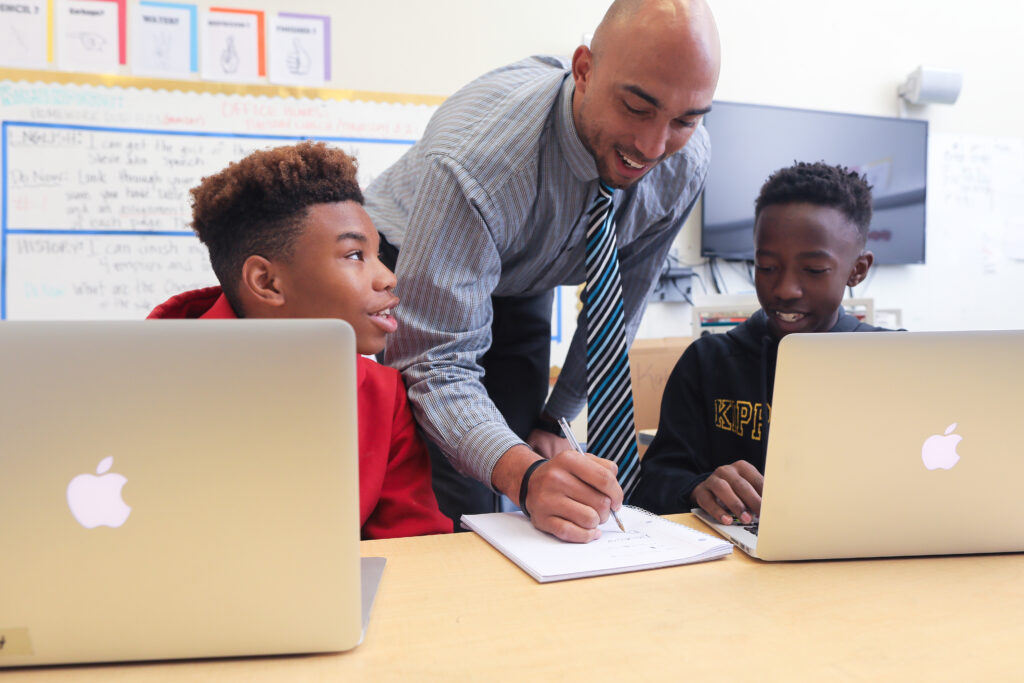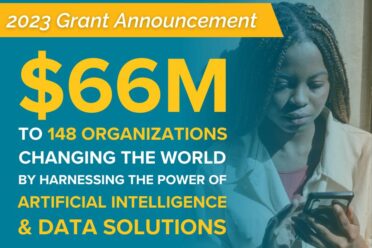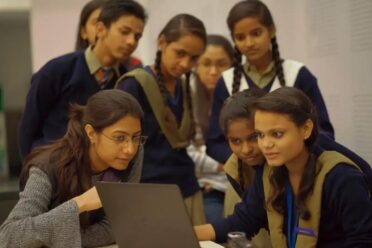Foundation awards more than $10 million to drive digital equity and to support relief and recovery for vulnerable communities
Throughout the pandemic, digital connectivity and skills have proven essential for inclusive economic participation and growth. Yet many vulnerable communities face significant challenges in digital access and literacy, including the lack of devices and connectivity, as well as access to upskilling and job training. To bridge the digital divide and create sustainable solutions that outlast the effects of Covid-19, the Patrick J. McGovern Foundation announced today more than $6 million in grants to expand access to tech education and build an inclusive workforce.
In addition, the Foundation made a further commitment of nearly $4 million in grants to strengthen nonprofits on the frontline of addressing economic and social vulnerability for those most impacted by the pandemic.
Through this most recent round of education and tech workforce grants, the Foundation partners with organizations to expand opportunities for early exposure to digital technologies both within and supplemental to K-12 settings. With hybrid and virtual education models on the rise, schools are working to adapt to the new technological landscape, but an opportunity gap persists and the most vulnerable are being left further behind.

“We need to come together to create new pathways to opportunity – early exposure, micro-skilling and credentialing – so we can all share in the prosperity of our digital future,” said Patrick J. McGovern Foundation President Vilas Dhar. “Our partners are advancing digital access, developing a robust tech talent pipeline, and addressing urgent challenges in a way that leverages tech skills as tools for social progress.”
The Foundation is also focused on providing resources for upskilling programs that empower individuals emerging from non-traditional career paths to enter the tech economy. These partnerships support innovative pathways for historically excluded communities, who remain underrepresented in the digital workforce.
“This grant supports the development of a comprehensive and culturally relevant curriculum for Native students, with whom we are building solutions with impact and meaning for our communities,” said Andrea Delgado-Olson, Executive Director of Natives in Tech, whose grant will support the Lakota AI Code Camp. “Natives in Tech has made it their mission to create a new narrative in which Natives are included and well-represented throughout the tech workforce.”
The Foundation provided nearly $4 million in grants to support vulnerable communities through the next stage of the pandemic. These grants are aimed at relieving hunger, preventing homelessness, providing aid to refugees, and supporting veterans.
Connor Schoen, Co-Founder and Executive Director of Breaktime, an organization that is breaking the cycle of young adult homelessness notes: “We empower young adults experiencing homelessness to build stability in their own lives while building resilience in their communities. The Foundation’s historic investment in our transitional employment program is game-changing in helping us achieve our mission.”
At the heart of all of these grants is the Foundation’s commitment to providing resources at critical points along the education and tech workforce learning journey, while supporting historically resilient communities in forging a better future through the pandemic and beyond.
“This grant supports the development of a comprehensive and culturally relevant curriculum for Native students, with whom we are building solutions with impact and meaning for our communities.”
Andrea Delgado-Olson, Natives in Tech
The new grants include:
Education and Tech Workforce
AI4ALL to provide support for increasing widespread access to AI education. ($250,000)
The AI Education Project to close the opportunity gap in AI education, literacy, and skills development. ($200,000)
AkiraChix to equip young women with technology training, upskilling and mentorship to compete economically and bridge the gender gap in tech. ($150,000)
AnnieCannons to equip survivors of human trafficking and gender-based violence with the digital, technical, and professional skills to thrive in the modern workforce. ($100,000)
Burundi Friends International to support tech upskilling programs aimed at driving economic empowerment. ($100,000)
Code.org to provide capacity building support for the CS Connections program. ($250,000)
Coding It Forward to support the expansion of the Civic Innovation Corps program. ($250,000)
Computer History Museum – To provide support for the Patrick J. McGovern Tech For Humanity Prize program ($125,000)
CSforAll to support the building of a network of providers, schools, districts, funders, and researchers working to ensure quality computer science education reaches children across the nation. ($250,000)
Entrepreneurship for All to provide support for inclusive entrepreneurship programming nationwide. ($100,000)
First Star to provide support for the FS National STEAM Academy. ($100,000)
Georgetown CSET to support the CyberAI Project, specifically for research on the cyber and AI talent pipeline. ($250,000)
Girls Inc. to support technology capacity building in service of the Girls Inc. mission to inspire all girls to be strong, smart, and bold. ($250,000)
The Hidden Genius Project to support capacity building across the organization, allowing exposure-based programming to reach more participants of color. ($500,000)
Kids in Tech to provide capacity building support for ongoing tech education programs and Boston area expansion. ($100,000)
Markle Foundation (Skillful LLC) to support Markle’s Rework America Alliance in advancing opportunities for millions of unemployed and low-wage workers to move into good jobs. ($750,000)
MIT Solve to provide support for the MIT Solve AI for Humanity Prize. ($250,000)
Last Mile Education Fund to invest in closing the graduation gap for talent from low-income households pursuing careers in the technology and engineering sector. ($250,000)
Management Leadership for Tomorrow (MLT) to support the MLT Black Equity at Work Certification Program. ($250,000)
Museum of Science, Boston to support the Center for Data Science, AI & Public Learning. ($150,000)
Natives in Tech to support the Lakota AI Code Camp – a three-week AI Code Camp with the goal of uplifting future Indigenous machine learning researchers. ($200,000)
NPower to support the buildout of a new California chapter in providing technology job training, mentorship, and placement services to underrepresented talent. ($150,000)
Per Scholas to provide support to build a Business Solutions team for the new Boston hub that strengthens employer engagement efforts through enhanced training, staff capacity, and access to the Emsi dataset. ($150,000)
Room to Read to support literacy and gender equality in education for children in low-income communities, and to help students overcome learning challenges caused by the pandemic through digital tools and human connectivity. ($125,000)
Team4Tech to scale Regional Hubs in Sub-Saharan Africa and Asia to create networks of support for nonprofit partners. ($125,000)
Tech Goes Home to provide support in advancing digital equity efforts across the City of Boston. ($250,000)
Technovation to develop an innovative curriculum that empowers hundreds of underserved girls around the world to use Responsible AI to develop innovative solutions tackling climate change. ($200,000)
The Tech Interactive to support The Tech for Global Good program, elevating stories of global changemakers using tech for social progress. ($200,000)
Solidarity
African Visionary Fund to provide organizational development support for innovative social sector organizations. ($150,000)
Blue Star Families to provide support for digital transformation efforts and exploration of Deployment Circles work. ($250,000)
Breaktime to support efforts to sustainably address youth homelessness and underemployment through workforce training and financial literacy programming. ($250,000)
Child’s Play Charity to provide support for the Pediatric Gaming Technology program. ($150,000)
Choose Love Movement to provide support for efforts to promote evidence-based social emotional learning curriculum in schools and communitiesthroughChoose Love for Schools and the Choose Love on the Move Tour. ($100,000)
The Collaborative for Academic, Social, and Emotional Learning (CASEL) to provide support for efforts to advance and share evidence-based social emotional learning practices in educational systems. ($250,000)
The Greater Boston Food Bank to support the Eastern Massachusetts emergency food response by providing over 100M pounds of nutritious food through 600 partner agencies to 190 cities and towns, and accelerate digital transformation. ($500,000)
International Committee of the Red Cross to support efforts to provide protection and assistance for vulnerable populations in Ethiopia. ($250,000)
International Committee of the Red Cross to provide support for AI- and data-related work in countries affected by armed conflict and violence. ($285,000)
Oxfam America to provide life-saving humanitarian assistance in northern Ethiopia. ($150,000)
Polaris to support improved analysis of the U.S. National Human Trafficking Hotline data, using data science and AI approaches, to inform anti-trafficking efforts. ($250,000)
University of California, San Francisco Foundation: Communicative Justice to support a participatory data literacy model to engage the Bay Area’s linguistically diverse adult learner networks to expand public health messaging and increase vaccine uptake. ($100,000)
University of California, San Francisco Foundation: HEAL Initiative to provide support to ongoing efforts to build sustainable and inclusive health workforce capacity serving vulnerable communities. ($200,000)
Victory Programs to provide support for programs addressing the intersectional challenges of homelessness, substance use, and chronic health conditions. ($150,000)
RefugePoint to support pathways for refugees and asylees in the U.S. ($200,000)
Team Rubicon to provide support for tech-enabled relief and response efforts. ($750,000)
Media contact:
George Mastoras
George.mastoras@mcgovern.org
(914) 489-5282


